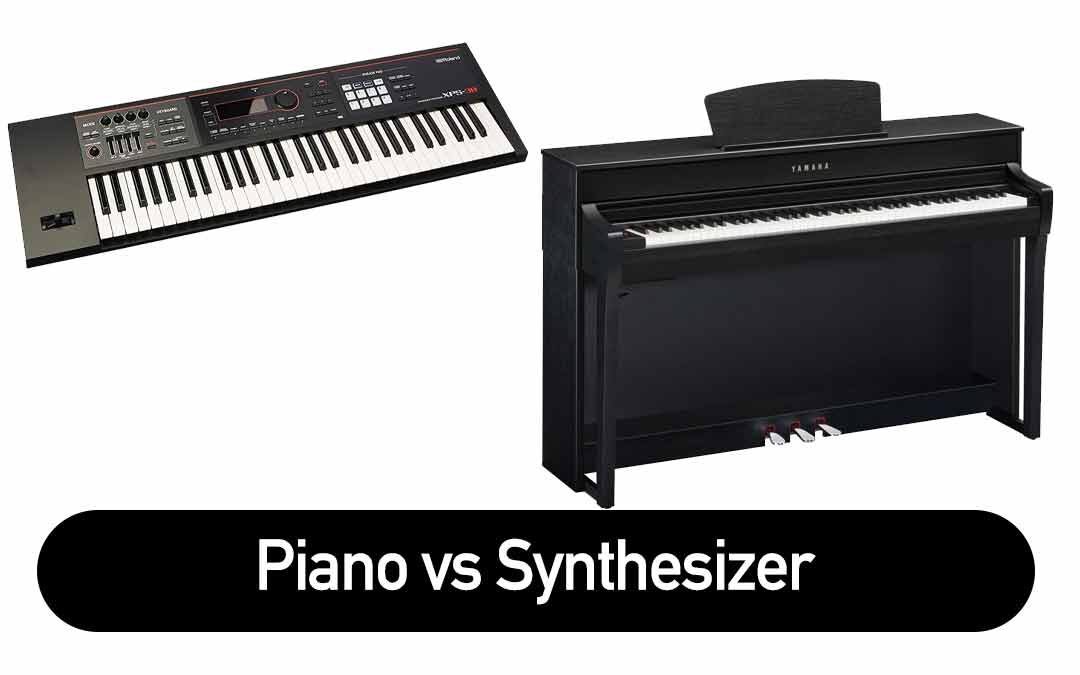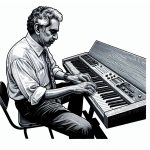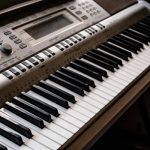If you're considering learning to play a musical instrument, you might wonder whether a piano or a synthesizer is the right choice. Both instruments have their unique capabilities and benefits.
Pianos are typically considered one of the most versatile instruments, capable of playing various genres. They also tend to be more robust and durable than synthesizers, making them a good choice if you're looking for an instrument that will last for many years.
However, pianos can be expensive to purchase and maintain, and they can also be bulky and difficult to transport.
On the other hand, synthesizers are often more affordable than pianos and much easier to carry around. They also usually have a more comprehensive range of sounds you can create, giving you more flexibility in your playing.
However, synthesizers can be harder to learn to play than pianos, and they may not have the same level of durability as a piano.
In this blog post, we'll explore the key differences between pianos and synthesizers so that you can decide which one is right for you.
Let's understand the essential features of acoustic pianos and how they differ from digital or electric pianos.
When you think of electronic instruments, the first thing you will find is that you can easily connect these musical instruments to a speaker system, the digital pianos give in-depth editing options and offer additive synthesis.
Here are some of the essential features of acoustic pianos and their differences from digital pianos:
- Acoustic piano differs from the digital piano in size and design. Digital pianos and electric pianos aim to create sound waves the same as an acoustic piano with the portability of the keyboard.
- The keyboard produce sound that makes the musical instrument similar to acoustic pianos. However, the portability of electric and digital pianos is the primary difference.
- An acoustic piano is often thought to be a real piano as the piano sounds are similar to a grand piano. However, a digital piano is no less of a real piano.
- The 88 keys of a digital piano can create a sound similar to stage pianos. The only difference is that they take up less space than stage pianos or acoustic pianos.
- When it comes to frequency modulation and creating different sounds, you will find that the electric piano and the digital pianos offer better frequency modulation synthesis. Most digital pianos use computer connectivity and digital signals to create sounds.
With the help of midi keyboards, you can create a better sound. A midi keyboard is similar to electric piano. However, when it comes to keyboard vs. synthesizer or piano vs. synthesizer, midi keyboards are identical to synthesizers and less like digital pianos.
Therefore, you can use electronic keyboards to create a sound similar to sound designers, which sets the electronic instrument apart from the upright and acoustic pianos.
Understanding electric pianos and how these are different from synthesizers.
When you think of digital pianos, you first have to understand that it differs from your regular synthesizers.
Most digital pianos will be similar to acoustic pianos in appearance, the only difference being these use the digital keyboard.
In addition, digital pianos have weighted keys and sustain pedals like grand pianos. Using digital pianos, you can also create sounds similar to grand pianos. Here is how these are different from synthesizers:
- The small midi keyboard is the first difference between digital pianos, electric pianos, and synthesizers.
- The synthesizer's keyboard makes it portable, and you can even create realistic sounds using these keyboards.
- Synthesizers utilize electricity to create sounds, and digital synthesis is done to create musical styles.
- Unlike acoustic or digital pianos that use fully weighted keys and chord progressions to create sounds, synthesizers utilize electricity to create sound modules.
- Unlike synthesizers, acoustic pianos generate sounds using hammers and strings. Digital pianos are musical instruments that use the original hammer and string method to create sound.
- Synthesizers have built-in sounds and all the features that make are one of the most accessible instruments to play in the keyboard family.
- Piano players often mention that if you find it challenging to play acoustic piano, you can start by learning to play the synthesizer.
The midi controller in a synthesizer makes it easier to play the instrument. With the help of the midi controller, you can even learn to play the polyphonic synthesizer and create a sound similar to experts.
The midi controllers can handle the pitch and velocity of notes. This allows manufacturers to assign different sound samples to other conditions.
In addition, the midi controllers make subtractive synthesis easier, and you can create sounds perfect for concert halls.
How does the synthesizer's ability to create different sounds make it the perfect digital piano?
When you think of stage pianos, the first thing that will strike you is the piano sound. However, when it comes to piano vs. synthesizer, it isn't easy to choose between musical instruments.
Both the digital pianos and synthesizers produce great sound. However, if you were to pick only one instrument, you would have to consider several factors before you state that midi controllers can create a better sound.
Some of the reasons why synthesizers sound better are as follows:
Subtractive synthesis:
Just as adding to the sound designs is essential, you must subtract information from the signal via filters. With the help of polyphonic synthesizers and sound design experts, you can ensure that the sound developed is perfect.
Selecting the best keyboard:
Regarding acoustic and digital pianos, it is all about understanding the behavior of the fully weighted keys. If you are not an expert in sound design, you can end up with cheap keyboards. But with the synthesizers, you can get some of the best keyboards and ones you can easily play with other instruments.
Enhancing the sound:
No matter how expensive, an excellent digital piano or a grand piano will not have features like built-in speakers. But if you purchase a synthesizer instead of a grand piano, you can enjoy something like built-in speakers.
The built-in speakers make it easier for you to understand the own sound of the keyboard. Similarly, with the built-in speakers, you can do away with the requirement of attaching the keyboard with an external speaker.
The synthesizer makes creating audio signals similar to pop music easy, and you can develop your sound module.
Expert piano players often mention that a better understanding of sound and the behavior of the sine waves make it easier for you to understand the instrument.
The synthesizer is an instrument that is easier to master than digital pianos but no less interesting.
Once you have mastered this instrument, playing a digital piano or an acoustic piano becomes easier.
What is a good digital piano? Are these simply digital musical instruments?
When it comes to selecting electric pianos or digital pianos, you need to select ones that produce audio signals and own sounds similar to that of Dave Smith instruments.
Here is what you can expect from good digital pianos:
- Dave smith's instruments are essentially synthesizers; hence, you should distinguish them from a digital piano. A digital piano will have a sustain pedal like grand pianos but produce slightly different sounds.
- The Dave Smith instruments include polyphonic synthesizers, and like the earliest digital pianos, it is one of a kind.
- A synthesizer generates sound by converting electricity to audio signals. In the case of a digital piano, the sound is defined based on its design.
- If you are looking for good digital pianos, you will have to check the manufacturer and their ability to create various sounds within a given range. However, in the case of a synthesizer, you can get all the features and a variety of other sounds.
A digital piano will be a good purchase because it is more affordable than an acoustic or grand piano. You will also find that with a digital piano, you can create various tone samples, effects, and production features.
Pianos and synthesizers, which sound better and which should you choose
When it comes to sound, digital pianos and synthesizers are different. This can create confusion because both trigger sounds utilizing a keyboard.
In the case of digital pianos, you might find that the appearance and behavior of the piano are akin to your standard piano. Digital pianos use magnetic pickups to convert the string vibration to electric audio signals you can amplify further.
Synthesizers are electrophones, meaning they do not create sounds through strings but rather by manipulating electricity.
Thus, when evaluating sampled sounds and understanding keyboard vs. piano vs. digital piano sound, you must understand that each has a different audio synthesis. You can choose an instrument depending on your requirement and preferred frequency modulation.
Conclusion
When trying to understand the difference between a piano and a synthesizer, you first have to realize that the sounds of the instruments will be different.
You will find that the sound of upright pianos is different from a digital piano; subsequently, it will be different from that of a synthesizer. Hence, the first step to understanding the difference between the instruments would be to understand the sounds of the keyboards.
Next, you need to understand that upright and digital pianos tend to have more space than synthesizers. So, if you do not have sufficient space to install a digital piano, the next best thing is to purchase a synthesizer and learn how to play the instrument.
Digital pianos need to be connected to a source of electricity, and you need to ensure that it is always plugged in.
On the other hand, synthesizers are portable electronic instruments that can run on batteries. Thus, depending on your requirement and what you want to learn, you can choose between a digital piano and a synthesizer.
Related Topics
Harlan Kilstein began playing piano during covid with no piano background at all. He taught himself how to play learning what to do and what not to do.
Today he's an advanced intermediate player and can help you grow in your skills because he learned all this on his own.








